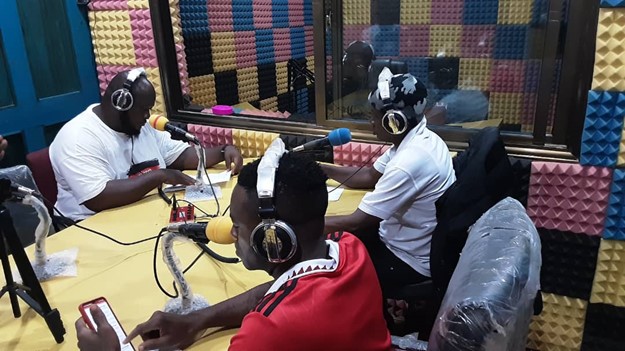
Image: Community radio show in Moyamba district
Community engagement, inclusivity and impact in Moyamba District, Sierra Leone
20 February 2025
In this article, Michael Munu, a research assistant, from the Institute for Development in Sierra Leone describes the impact his team’s work is having on community collaboration in two learning site districts.
ReBUILD for Resilience Sierra Leone is a participatory action research project that has been actively ongoing in Moyamba and Kailahun districts since November 2022. The primary goal of the project is to unite stakeholders to address community issues collaboratively. Before implementing the project, stakeholder mapping was conducted in both districts to identify key community figures with influential voices that could be brought together to discuss and brainstorm solutions about the affecting issues at community level. Following this mapping and the development of a problem tree, the groups set about identifying the major issues affecting their communities and meeting to discuss solutions to the identified problems.
To bridge the communication gap that has been in existence between the local stakeholders and the community people, and to ensure effective coordination of the project at district level, research assistants have been employed in both districts.
Taking action
Each month, stakeholders gather with the district health management team (DHMT), coordinated by the respective district research assistant. During the meetings, stakeholders provide updates on health, security threats and other affecting issues in their communities. Discussions focus on finding solutions to address the issues raised, often leading to radio discussions (see image) where we hear from expert voices chosen to represent the groups to elaborate further on the challenges discussed. Any action items identified during meetings are assigned to specific individuals. Progress on these items is reviewed at the subsequent meeting and further action item planning is updated accordingly. When topics discussed during meetings are broadcast on the radio, experts receive and address calls and text messages from the community people.
Through media and continuous community engagement the groups are working to help reduce maternal deaths by promoting community deliveries, and to help reduce the intake of KUSH (a local drug) among the youth in Moyamba. The stakeholder meetings have also prompted several positive activities, including monthly cleaning initiatives in Moyamba district headquarter town, carried out without government support. Previously, the Sierra Leone government supported all districts to undertake cleaning exercises. Most districts, including Moyamba, were unable to continue facilitating these cleaning practices once government support was revoked, so their revival in Moyamba and Kailahun districts can be attributed to the ReBUILD project.
Regular interactions in meetings and radio discussions have also fostered a sense of unionism and collaboration among stakeholders, which was previously lacking. Also, health and security threats can now be quickly communicated among stakeholders and addressed through a dedicated stakeholders’ WhatsApp group. This project has demonstrated that stakeholders can address their own issues using their available resources, thereby enhancing community ownership. However, there are challenges often faced by the research assistants, such as needing to transport stakeholders via motorbike so that they can attend meetings. Meetings frequently start late due to stakeholders’ personal delays and scheduling conflicts, which makes coordination challenging and sometimes leads stakeholders to send representatives in their place instead of attending in person. Weather conditions also complicate the timing and attendance of the radio discussions.
In order to see the continuation of these meetings, the ReBUILD for Resilience team has placed great emphasis on monitoring stakeholders and their contribution closely. The District Health Sister One (DHS1) testified about the impact of the project, explaining that through stakeholder meetings and continuous engagement via radio stations, they were able to solve most of the issues at the community level.
Image: Community radio show in Moyamba district